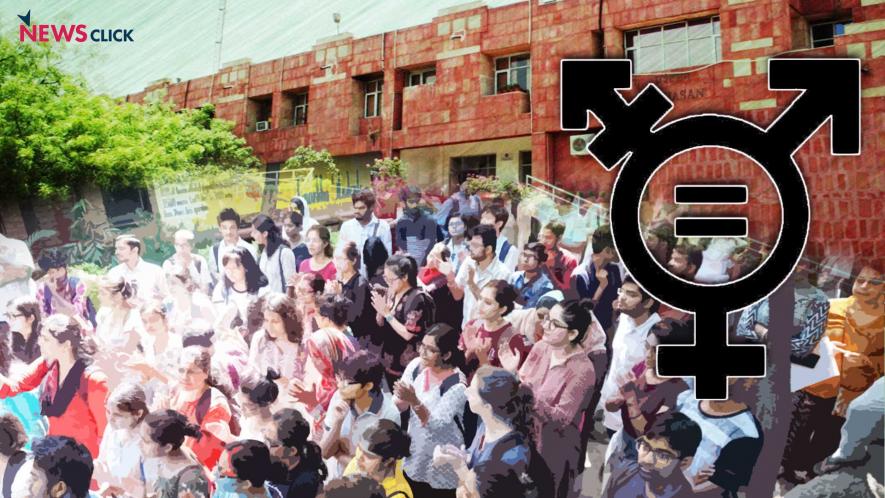GSCASH in JNU: Gender Justice Long live, Gender Equality Long live

Newsclick Image by Nitesh Kumar
The ongoing attempts of the administration in the Jawaharlal Nehru University, New Delhi to shut down the Gender Sensitisation Committee Against Sexual Harassment(GSCASH), which is one of the most significant model of such committees to actually work for gender equality, is a reflection of how questions of gender equality is a nightmare for the patriarchal society. The GSCASH is an institution which was created after a prolonged struggle and it has come under attack under several occasions precisely because it is a direct threat to the ideals of gender equality. I can say this with such confidence and blind faith because of my own personal experience of working within this institution. I was an elected student representative to this body for the year 2012-2013. It was a year when the GSCASH was heavily loaded with significant cases which concerned prominent figures in the world of academia. In all of these cases after rigorous processes of enquiries, depositions, meetings and findings the GSCASH concluded with these professors of eminence being guilty of committing acts of sexual harassment in each of these respective cases.
As a consequence of which the whole team in GSCASH was witness to direct lines of warnings, threats and all forms of humiliation to back down from reaching towards decisions which threatened the positions of these people. The enquiry teams of different cases have faced all sorts of repercussions which vary from outright threats or massive slander campaigns through various forms of signature campaigns, postings and other such tactics. While this has been the trajectory so far the GSCASH members have borne with such tactics of intimidation because of the commitment to responsibly uphold the duties entrusted to all of us as members of a duly elected and responsible body. The major challenge so far had been the decision of the EC meetings which has the final say in deciding whether to accept or reject the findings of the GSCASH. Through out the tenure of the GSCASH, it is this stage of the EC meetings which has made very attempts possible to turn down the decisions and findings of the GSCASH which is again a reflection of how and why GSCASH has been a threat to the institutionalisation of patriarchy in JNU. It is because of the power of the EC to curb down the decisions of the GSCASH, one of the major suggestion from all sections of the progressive groups in JNU had been to make the decisions of the GSCASH binding.
The GSCASH has its own rules and regulations which was framed after a rigorous process in consultation with eminent feminist advocacy groups and legal counsel. As an ex member of the GSCASH and being part of the enquiries during my tenure I can vouch for the confidentiality and the rigorous process of the enquiries which is conducted by the enquiry committee(EC) set up for different cases by the general body meeting of the GSCASH. As members of such committees it is our responsibilities and commitment to conduct fair and impartial enquiries which is finally presented before the larger GBM of the GSCASH which then takes the final decision on ‘guilty or not guilty.’
In my own experience of being a member of such committees I understand how important it is for us to act in a free, fair and mature manner to arrive upon such conclusions. I can understand the pressure one feels in being part of such an enquiry. The power dynamics which is involved is not just between the complainant and the one against whom the complaint is registered but also between the enquiry committee members and the parties involved. I have personally experienced massive slander campaign against me and other faculty members who were part of these challenging cases that came up before us in the GSCASH. Most of these kind of outbursts have often been in the student vs faculty cases which is to show how and why the GSCASH is extremely significant to uphold values of gender justice on campus. However it was our commitment and a personal sense of responsibility to conduct our duties which helped us sail through such hostilities and uphold the ideals of the GSCASH.
I would like to emphasise on the power of being an elected student representative that gave me the courage to sail through this power pressure. I was independent of any kind of influence and I had the mandate of an electorate which had entrusted in me the responsibility of being vigilant and working for the body as a free and unbiased participant. I had the luxury to be a part of the proceedings without the fear of being threatened or swayed or influenced or being scared. The first day I joined GSCASH as a student representative, I was ‘advised’ by one of my professor to be wary and cautious of my role in GSCASH. I was subtly told not to be blinded by people who would try to ask me to be bold against faculty members. I took this is a subtle warning rather than an advice and believed in the mandate of the student community who had elected me and it was this student body along with the progressive faculty members who stood by my side during my tenure.
I am sure all present and past members of the GSCASH will vouch for this kind of power politics which comes into play and which each one of us has experienced during our respective tenures. This experience taught me a lot and gave me strength in further pursuing the ideas of gender justice and made it central to my life. The year we worked in GSCASH was hectic through out as we had to deal with endless cases which can be found in the annual report (if it has not already been destroyed). These cases and findings are crucial and important documents which is evidence of the struggle of the GSCASH which has sailed through endless problems and challenges. Today it faces the most important challenge of being completely destroyed. A nominated body will fail to live up to the ideals and values of what the GSCASH stands for today. In a research institution like JNU which has served to provide a safe space for students, workers and others alike the absence of a strongly elected body like GSCASH will inevitably result in direct violation of the ideals of gender justice.
Despite years of GSCASH, many cases of sexual harassment are often either subdued or gone unheard of with the victim of such cases silently bearing with it or backing off and ultimately leaving the campus. The presence of GSCASH has given strength and confidence to many women especially who would have entered campus as a scared, under confident person unaware of the ideals of gender justice but left the campus as a strong, independent woman aware of her rights and powers to fight for gender justice. I firmly believe this through my own experience and the battle has begun once again with this line of attack that has come to the doorstep of JNU. This fight is not just about saving GSCASH as an institution but a larger fight against patriarchy and misogny and it is one of the toughest battle that JNU will have to face as an embodiment of progressive, democratic values.
When I first came to JNU as a research scholar, the most prominent line I heard every where was , ‘What JNU thinks today, the rest of the country thinks about it tomorrow’ and once again the ongoing battle for gender justice is hallmark to this line of argument. This was proved when the whole country rose up in anger against the 16th December, 2012 gang rape incident in Delhi. It was a significant moment for the feminist advocacy groups because questions of gender finally entered the domain of the mainstream through various forums. While the nation was finally familiarising itself with ideas like patriarchy, sexual violence, sexual assault, sexual harassment and was awakening to ideas of gender equality and making the streets and public places safe for women, the spaces in the campus of JNU had already fought that battle and created such spaces for women and men alike a decade ago. It therefore makes absolutely no sense to replace GSCASH which in itself is a model that should actually be set up in all workplaces and institutions to make these public spaces a sexual harassment free zone in theory and practice.
Author is an Assistant Professor in Darjeeling Government College and was GSCASH elected student Representative in JNU.
Disclaimer: The views expressed here are the author's personal views, and do not necessarily represent the views of Newsclick.
Get the latest reports & analysis with people's perspective on Protests, movements & deep analytical videos, discussions of the current affairs in your Telegram app. Subscribe to NewsClick's Telegram channel & get Real-Time updates on stories, as they get published on our website.
























